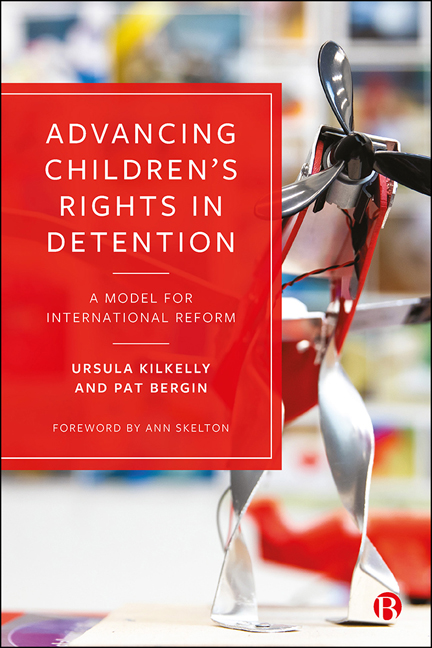Book contents
- Frontmatter
- Contents
- List of Cases and Instruments
- List of Figures
- About the Authors
- Acknowledgements
- Foreword
- Introduction
- 1 Children’s Rights in Detention
- 2 An International Perspective
- 3 Irish Youth Justice Law and Policy
- 4 Introducing Child Detention in Ireland
- 5 Oberstown and the Process of Change
- 6 Implementing Children’s Rights in Detention
- 7 Children’s Rights to Protection from Harm
- 8 Staff Wellbeing and Communication
- 9 International and National Influences and Advocacy
- 10 Reflections: Enablers and Barriers to Reform
- Afterword
- References
- Index
10 - Reflections: Enablers and Barriers to Reform
Published online by Cambridge University Press: 13 May 2022
- Frontmatter
- Contents
- List of Cases and Instruments
- List of Figures
- About the Authors
- Acknowledgements
- Foreword
- Introduction
- 1 Children’s Rights in Detention
- 2 An International Perspective
- 3 Irish Youth Justice Law and Policy
- 4 Introducing Child Detention in Ireland
- 5 Oberstown and the Process of Change
- 6 Implementing Children’s Rights in Detention
- 7 Children’s Rights to Protection from Harm
- 8 Staff Wellbeing and Communication
- 9 International and National Influences and Advocacy
- 10 Reflections: Enablers and Barriers to Reform
- Afterword
- References
- Index
Summary
Introduction
This final chapter aims to draw together the book's analysis of the experience of implementing children's rights in detention. To recap, Chapter 1 explained the imperative for a children's rights approach to detention and, drawing on a range of international instruments including the United Nations Convention on the Rights of the Child (CRC), proposed an integrated model of child detention that advances children's rights. Under this rights-based model, child detention must be child-centred and fulfil the child's rights to provision, protection, participation, preparation and partnership. As Chapter 2 illustrated, children's rights are routinely breached and ignored in detention around the world, although proposals for more radical, rights-based reforms are beginning to emerge. Many of the issues highlighted internationally were concerns in Ireland as well – use of adult prisons, inadequate standards of care, high levels of restrictive practices, insufficient focus on the child's complex needs and a marginalization of children within the process – when the commitment was set out in law and policy to establish a specialist, child-centred model for all children under 18 years of age in detention. Ireland's experience is thus highly relevant to the global context and Chapters 3 to 9 explored how the commitment to advance a children's rights approach to detention has been implemented in Oberstown. It began in Chapter 3 by tracing changes to law and policy that followed Ireland's ratification of the CRC in 1992, before focusing, in Chapter 4, on the specific requirement, set by government policy, to establish a child-centred model of detention for all children under 18 years of age. These chapters provided the foundation for the more in-depth analysis that followed. Chapter 5 presented an analysis of how this mandate was taken forward to create a single, national facility for the care of children deprived of liberty, describing elements of the disruptive and at times difficult change process. As Chapters 6 and 7 showed, however, the steps taken have now begun to bear fruit in numerous ways, most notably improving children's experiences of their rights in detention through the implementation of the rights-based model. Chapters 8 and 9 complemented these developments by demonstrating how vital it is to support the staff who provide care to children, while reinforcing the role of communication, engagement and external advocacy and scrutiny as crucial enablers in the process.
- Type
- Chapter
- Information
- Advancing Children's Rights in DetentionA Model for International Reform, pp. 155 - 176Publisher: Bristol University PressPrint publication year: 2021



